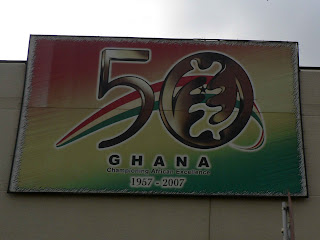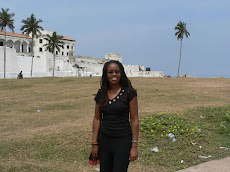



In July, a good friend decided that he would celebrate his 40th birthday in Ghana and invited me to join him on the trip. He didn’t have to ask twice. The big day was August 16 (although I didn’t arrive until August 17). Lucky for him, this was not his first trip; he suffered from acute poisoning after a steak dinner on day two, which seriously impacted his ability to get out and about.
I must say that the plane ride was the BOMB. I traveled using frequent flyer miles and fortunately, I had no option about whether to travel economy or business class, because only business class was available. It is very easy to get spoiled by the right type of business class. The seats were wide and comfy, fully reclined into horizontal position, and were just heavenly…….. Ahhhhhhh…….But enough about the plane.
This post is about my sojourn to a West African nation filled with history and lore. Ghana is the birthplace of Kente cloth, one symbol of African identity, pride, and honour embraced by masses of African-Americans; it is the home of ancient Kingdoms and Empires; it is a nation where millions of blacks were sold into slavery and transported to the United States and other former slave-holding countries; and among other historical markers, it is the first sub-Saharan African country to gain independence from European colonial powers.
It seems impossible to visit Ghana without exploring places that played critical roles in the transatlantic slave trade. According to one tour guide, over half of the European-owned coastal forts and castles discovered along West Africa are located in Ghana. I visited a few former trading posts and the experiences were very moving. The “Door of No Return” was eerie at both Elmina Castle and Cape Coast Castle. It was through these doors that millions of chained men and women left Africa, boarded ships, and never saw their freedom, family, homelands, and some of their various cultural traditions again. Another feature of each castle that left visitors caught in thought were the churches and chapels where captors and traders worshipped, seemingly without regard for the inhumanity of their subjugation practices. I also found it interesting that one former trading castle in Accra now serves as the Presidential Palace.
I will not soon forget the TRAFFIC in Accra. It was seriously no joke. Luckily, there were things to do while waiting for the congestion to clear. If you were in the mood to shop, you could buy just about anything you needed right from your car window. Street hawkers took vending to the next level. Candy, drinks, fruit, vegetables, clothes, toiletries, jewelry, houseware, toys, pets/puppies, you name it, a street vendor had it. I was amazed that (1) I did not see anyone get hit by a car during their weaves in and out of traffic to make a sale, and (2) I did not see many product-casualties – vendors carried most products on their heads!
Another etched memory is the endless homage to President Barack Obama and First Lady Michelle Obama. The Obama’s visited Ghana about one month prior to our trip. There were billboards everywhere welcoming the president and couple, and declaring a “new day,” promising future of change, and partnership between Obama and the Ghanaian President.
It was a definitely unique and memorable trip. There is so much to share about the sights, sounds, and discoveries in Ghana, I'll have to do it in pieces and in person.
Day 1: Arrive at Kotoka International Airport
Day 2: Accra Mall; Internet Café; Dinner at a rooftop restaurant in Accra
Day 3: Nima Market; Ghana School of Law; Supreme Court; Kwame Nkrumah Museum and Memorial Park; Greater Accra Centre for National Culture; Evening trip to Lister Hospital (not for fun)
Day 4: General touring and shopping around town; Jonathan’s speaking engagement at University of Ghana – Legon
Day 5: Shopping around Town; Dinner and Movie at Accra Mall
Day 6: Taxi to Akosombo Dam and Dodi Princess Cruise on Lake Volta (largest man-made lake) –Dancing!!; Evening concert at Alliance Francaise Accra– More Dancing!!
Day 7: Jonathan’s return flight to the U.S.
Day 8: Connect with One Africa Guest House owner at the W.E.B DuBois Memorial Centre for Pan-African Culture; Drive to Elmina
Day 9: Canopy Walk in Kakum National Park; Tours of Elmina Castle and Cape Coast Castle
Day 10: Early Morning bus from Elmina to Accra; Evening flight from Accra to Johannesburg







.jpg)